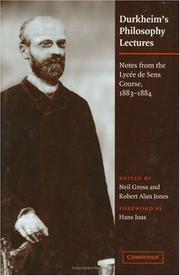| Listing 1 - 4 of 4 |
Sort by
|

ISBN: 1139926985 1139929720 1139929348 1139936778 1139931636 1139933582 1139939106 0511628080 9781139939102 9780511628085 9781139931632 0521085047 9780521085045 0521097126 9780521097123 9781139926980 9781139929721 9781139929349 9781139936774 9781139933582 Year: 1974 Publisher: London Cambridge University Press
Abstract | Keywords | Export | Availability | Bookmark
 Loading...
Loading...Choose an application
- Reference Manager
- EndNote
- RefWorks (Direct export to RefWorks)
This 1972 book is a collection of Durkheim's writings drawing upon the whole body of his work. Dr Giddens takes his selections from a wide variety of sources and includes a number of items from untranslated writings in the Revue Philosophique, Annee Sociologique and from L'evolution pedagogue en France. Selections from previously translated writings have been checked against the originals and amended or re-translated where necessary. Dr Giddens arranges his selections thematically rather than chronologically. However, extracts from all phases of Durkheim's intellectual career are represented, giving the date of their first publication, which makes the evolution of his thought easily traceable. In his introduction Dr Giddens discusses phases in the interpretation of Durkheim's thought, as well as the main themes in his work, with an analysis of the effects of his thinking on modern sociology. The book is for students at any level taking courses in sociology, social anthropology and social theory in which Durkheim is one of the major writers studied.
Sociology. --- Social theory --- Social sciences --- Sociology --- Social Sciences

ISBN: 1134273673 1280059583 020333714X 9780203337141 0415349133 0415349125 9781134273621 9781134273669 9780415349123 9780415349130 1134273665 9781134273676 9781280059582 Year: 2004 Publisher: London New York Routledge
Abstract | Keywords | Export | Availability | Bookmark
 Loading...
Loading...Choose an application
- Reference Manager
- EndNote
- RefWorks (Direct export to RefWorks)
"Emile Durkheim is regarded as a 'founding father' of sociology, and is studied in all basic sociology courses. This handy textbook provides a collection of the key passages from Durkheim's major works and successfully encapsulates the core of his sociology." "With this text, Kenneth Thompson has effectively filled a gap that previously existed in the literature available on Durkheim, by providing an outstanding collection of modern and reliable translations. Offering both in-depth coverage and useful reference, this text provides an indispensable aid to those seeking to gain access to Durkheim's writings."
Sociology. --- Social theory --- Social sciences --- Sociology

ISBN: 9781136622793 1136622799 0415386063 9780415386067 041538608X 9780415386081 0415569060 1136622861 1315020599 Year: 2006 Publisher: London
Abstract | Keywords | Export | Availability | Bookmark
 Loading...
Loading...Choose an application
- Reference Manager
- EndNote
- RefWorks (Direct export to RefWorks)
First Published in 2005. Routledge is an imprint of Taylor & Francis, an informa company.
Education, Secondary -- France -- History. --- Education, Secondary --- History.

ISBN: 9780511499302 9780521630665 9780521175425 9780511211478 0511211473 0521630665 0511215053 9780511215056 051121684X 9780511216848 0511499302 1280541016 9781280541018 0511211473 0521630665 0521175429 1107142490 0511315538 0511213247 9781107142497 9780511315534 9780511213243 Year: 2004 Publisher: Cambridge, U.K. New York Cambridge University Press
Abstract | Keywords | Export | Availability | Bookmark
 Loading...
Loading...Choose an application
- Reference Manager
- EndNote
- RefWorks (Direct export to RefWorks)
Moving back and forth between the history of philosophy and the contributions of philosophers in his own day, Durkheim takes up topics as diverse as philosophical psychology, logic, ethics, and metaphysics, and seeks to articulate a unified philosophical position. Remarkably, in these lectures, given more than a decade before the publication of his groundbreaking book, The Division of Labour in Society (1893), the 'social realism' that is so characteristic of his later work - where he insists, famously, that social facts cannot be reduced to psychological or economic ones, and that such facts constrain human action in important ways - is totally absent in these early lectures. For this reason, they will be of special interest to students of the history of the social sciences, for they shed important light on the course of Durkheim's intellectual development.
Philosophy --- Social sciences --- #SBIB:052.AANKOOP --- #SBIB:316.20H32 --- 316.2 DURKHEIM, EMILE --- 316.2 DURKHEIM, EMILE Sociologische richtingen. Sociologische scholen. Sociologen--DURKHEIM, EMILE --- Sociologische richtingen. Sociologische scholen. Sociologen--DURKHEIM, EMILE --- Social philosophy --- Social theory --- Mental philosophy --- Humanities --- De sociologie van Emile Durkheim: secundaire bronnen --- Philosophy. --- Social Sciences --- Sociology
| Listing 1 - 4 of 4 |
Sort by
|

 Search
Search Feedback
Feedback About UniCat
About UniCat  Help
Help News
News